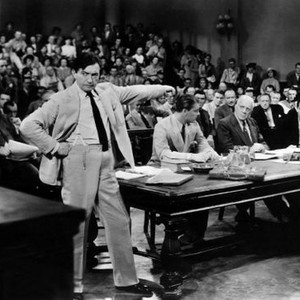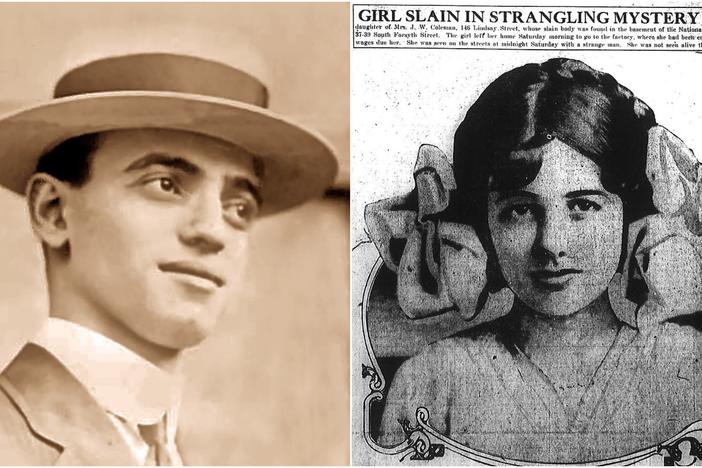After the discovery of Mary Clay's body in the elevator shaft by the school janitor, the janitor is arrested on suspicion of murder. Although, due to it being a heavily-Confederate-proud Southern town, I suspect the quick arrest of the janitor was also because he was a black man.
The movie, unfortunately, breezed over his arrest.
As the story develops, a viewer can see that there's a high competition for a conviction rather than the correct conviction in both the local newsroom, the police station, and the district attorney's office. The reporter feed on and published gossip while the police and DA executed some form of an investigation.
I personally thought there wasn't much of an investigation. The officers relied on the gossip that the reporter relayed to them before publication.
Eventually, Clay's professor, Robert Hale, was arrested for the murder on hearsay and gossip the reporter got from Emogen Mayfield, a classmate of Clay's that claimed to have been a friend. The cops had gotten the information that Clay had liked Hale from the reporter, who'd gotten it from Mayfield.
When the police went to arrest Hale, he was receiving a freshly-cleaned coat from a boy. When asked about why the coat had to be cleaned, the boy said it was because of a red stain that he suspected was either blood or juice.
Quickly after his arrest, Hale's wife is bombarded by reporters invading her home and overwhelming her with information that her husband had been officially arrested and charged. They even use her as someone only able to give a "money shot" to the point that she's photographed while she's fainting.
After Mrs. Hale faints, the reporters illegally and unethically search the home for long-shot items of evidence. One reporter even steals a photo or a paper slip while a female reporter tries to coax information out of the wife on the basis that it was just a woman-to-woman conversation.
The media across the nation gets word of the events occurring in the town. Outlets keep stoking the fire and riling up divide and pushing for an angle that only is prejudicial of Mr. Hale. The stories are spun out of context so far that the conflict is nicknamed a pseudo-Civil War between the Southerners and the Northerners.
It grows worse after a New York detective comes down to figure out the truth behind the dramatic reports. The locals and legal system are skeptical of the new New Yorker in town and are cold to him and the families of the Hales as they arrive and the trial commences.
The trial is filled with speculation and reporters creating daily headlines out of the court day. The janitor is used as a "significant" witness in an already-weak case.
Unfortunately, Hale was convicted with what seemed to be an unanimous guilty verdict.
Hale's lawyers tried getting him to a safer prison away from the town to serve his sentence but the train they were traveling in was stopped by an angry mob.
The mob forced the lawyers away and kidnapped Hale. The movie only implies the manner of Hale's death. The movie also ends on a somber and angry note from Hale's widowed wife, calling out the reporter and district attorney for their unethical performance as members of the press and of the law, respectively.
Unfortunately, the real man depicted as Hale is still being judged after all this time with a new depiction on the stages of Broadway.
Parade (depicted right), a Broadway musical that dramatizes the same events of They Won't Forget, is more closely related to the reality of the case and people involved. For one thing, there was no school or professor or headmasters or school janitor. The conviction had been largely believed to be a false conviction.In 1913, Mary Phagen was a 13-year-old girl (changed to 16-year old Mary Clay in the movie) who was murdered in Marietta, Georgia. She was a child laborer in the National Pencil Factory.
Leo Frank (changed to Professor Hale) was a mechanical engineer that became the new director of the National Pencil Factory shortly before Phagen's death. He was born to a Jewish family in Texas that moved to New York, where he was raised. He gained his mechanical engineering degree in Atlanta, Georgia, and was a significant leader in the local Atlanta Jewish community.
The night watchman, Newt Lee, was the one who found Phagen in the basement. He was a black gentleman who was arrested based on very circumstantial evidence found with Phagen. In the movie, Lee was a janitor who was arrested. However, in reality, Lee was separate from the actual janitor, another black man by the name of Jim Conley.
Multiple men had been arrested for Phagen's murder but the man that faced trial was Frank. Frank had been arrested later in the same year.
What was the same in the movie was that Conley's testimony was vital in the convicting of Frank (below, left). He claimed that Frank forced him to be an accomplice in the murder. Today, it's believed that Conley was the actual killer of the young Phagen (below, right).
Frank originally was sentenced to death but the Georgia governor changed it into being a life sentence due to lack of evidence. It was true that the media was heavily engaged in the trial, so much so that the trial was nicknamed a "trial of the century." While the movie said the reporters called Hale guilty, the reality is that the local media said that Frank's guilty conviction was a tragedy.It was the rest of the country that despised Frank and supported the weak guilty conviction. Hate and anti-semitism rose against him as well as the jewish community.
Unfortunately, the movie did get something right. Two years after his conviction, a group of armed men kidnapped Frank and lynched him in Marietta, Georgia, where the trial had been. Additionally, the lynchers were never brought to justice.
The Anti-Defamation League was created due to Frank's case and trial. The Ku Klux Klan was also revived around the same time.
It wasn't until 1986 that Leo Frank was pardoned for the murder of Mary Phagen
.





No comments:
Post a Comment